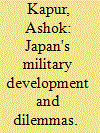| Srl | Item |
| 1 |
ID:
132791


|
|
|
|
|
| Publication |
2014.
|
| Summary/Abstract |
Japan merits serious study as a diplomatic and strategic power in the twenty-first century for several reasons. Although her population size is declining because of shrinking birth rates and restrictive immigration, the ratio of seniors is increasing --with increasing demands for pensions and state-supported safety nets - and the number of younger participants in the growth of her economy and public life is declining, the Japanese people have demonstrated a high degree of discipline and internal social cohesion at times of war, peace and crisis. An example is their fortitude during the recent (2011) nuclear and tsunami disasters. After 1945, her social and political values stress the importance of harmony and consensus building in her domestic arrangements, and the Japanese people and ruling elites value rejection of war as the sovereign right of the Japanese state. For this reason, domestic public opinion matters in the making and orientation of Japan 's external policies following her defeat in 1945 and with the establishment of a pacifist constitution and constitutional democracy. The population is not easily swayed by radical political and nationalistic rhetoric, even though in recent years, nationalist sentiment has grown in Japan and this was signalled by the election of Prime Minister S/2in;o Abe (2012). Still, despite the centre-right tilt in Japanese public and elite opinion in recent years, the Japanese people demand a thorough assessment of new moves to shift strategic policy and constitutional arrangements on defence issues.
|
|
|
|
|
|
|
|
|
|
|
|
|
|
|
|
| 2 |
ID:
123757


|
|
|
|
|
| Publication |
2013.
|
| Summary/Abstract |
Diplomatic power and influence, coexistence-style, concerns the ability to determine the framework governing international security management. It requires a programme for international order that devises methods on how to manage the use of force, jurisdiction over peoples and territory and international agreements. China's diplomatic strategy is based on its constitutional concept of peaceful coexistence. This concept has been translated into a programme for order that involves governmental consent, United Nations' (UN) authorisation and approval from regional or functional UN-based organisations as a requirement for using force; effective control and respect for the legal equality of states as a precondition for exercising jurisdiction over peoples and territory; and absolute sovereignty as a basis for the validity of international agreements. The dominant element of Beijing's strategy is coexistence diplomacy, which has allowed China to become a maker of international order.
|
|
|
|
|
|
|
|
|
|
|
|
|
|
|
|